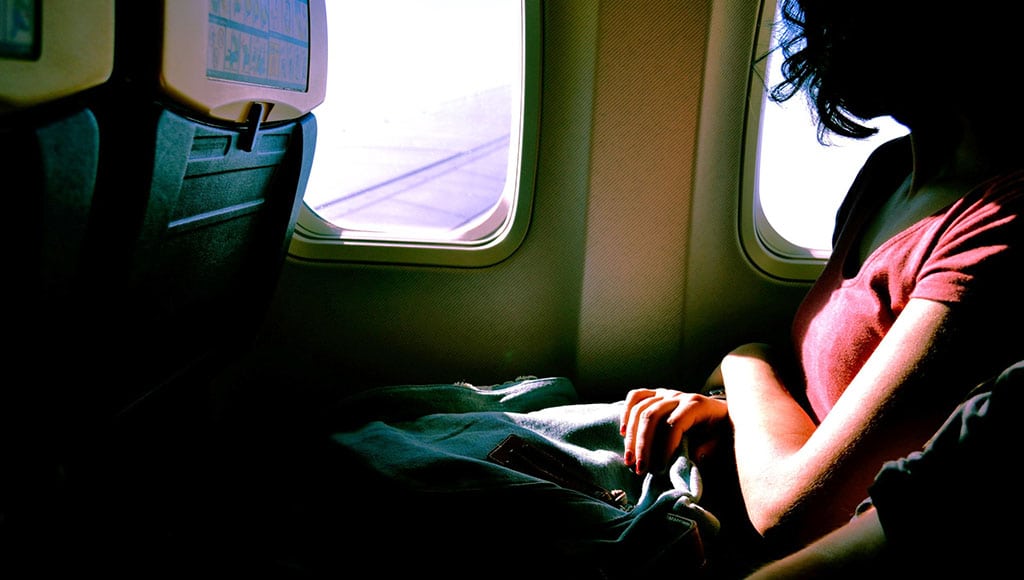Summer is upon us and traveling time is here as vacation season has begun. Having to catch a plane, a train or a bus can be, for a lot of people, a somewhat stressful experience. The seats in airplanes, cars, buses, and trains aren’t always the most comfortable and sitting still for an extended time can aggravate painful areas in the back and neck.
Whether you are traveling for business, vacation or to see loved ones, there are simple steps you can take to reduce the stress of your next trip. The following tips can help make your travel a bit easier.
One of the first things to do to travel well is to dress in comfortable clothes that are not too tight and, for ladies, avoid wearing high-heeled shoes or boots, especially in airports where you might have to walk long distances.
If you are carrying hand luggage, we recommend that you either use a suitcase on wheels or a bag with a shoulder strap that you can wear across. It is a lot less strain on your back to carry something heavy closer to your body.
For your bigger luggage, again, a suitcase on wheels is the best, but be careful with the weight of your suitcase. When traveling by plane, we often weigh our bag so we do not exceed the maximum allowed weight, but traveling by car, you might not pay attention to the excess weight you are putting in one bag. Don’t overdo it – don’t try to lift something too heavy for you. If you have to strain to carry the load, it’s too heavy.
Once you are ready to load your suitcase in the trunk of your car, you can do it by breaking the process into steps such as lifting it first to a chair or stepstool, then lifting it into the trunk. Other important lifting tips include:
- Bend at the knees and use leg muscles rather than back muscles to lift
- Avoid twisting the low back while lifting; instead, pivot with the feet
- Carry heavy items as close to the body as possible
- Distribute weight evenly on each side of the body
Make sure you bring water to drink in the car, or at the airport once you have passed the security control. Get a big bottle of water so you can keep yourself well hydrated during your trip. Your intervertebral discs are made out mainly of water, and drinking plenty of water is a really a good habit. It will also help in not getting cramps in your leg muscles.
If you are experiencing spinal discomfort or back/neck pain, or simply want to prevent it, see your chiropractor before you travel. Getting your spine well adjusted helps you to handle prolonged time sitting and keeps you more flexible and adaptable. Chiropractic care has a history of producing excellent results with those suffering from spinal pain. And it is done naturally, without drugs or surgery.
If you do have to travel with spinal problems and did not make it in time to your chiropractor, you may want to use a low back support belt for your lumbar spine or a soft cervical collar for your neck, especially if you travel long distances and it is painful to sit for a long time. These aids can be very useful.
To better control pain, you can also follow these recommendations:
Alternate between heat and ice
Alternate every 15 minutes between heat therapy that can loosen up the tissues around the spine, and ice treatment that can decrease inflammation and swelling.
Here’s what you can do:
- Stock up on inexpensive heating options like ThermaCare heat wraps or warm gel packs and apply them to the painful area.
- Bring an empty hot water bottle and ask the flight attendant to fill it up with warm water so you can use it during your flight.
- Carry a small gel pack on the plane and have the flight attendant store it in the fridge while you are not using it or have a ziplock bag on hand and ask to have it filled with ice so you can apply it to your back.
Remember not to apply heat or ice directly onto the skin but put a thin cloth between your skin and the ice or heat pack.
Most importantly, do not wait for pain to dictate your life; prevent with regular chiropractic adjustments. One ounce of prevention is worth a pound of cure.
Don’t let your neck or back pain ruin your vacations, see a chiropractor.
By Sandra Genest-Boudreau
|| features@algarveresident.com
Sandra Genest-Boudreau is French-Canadian, who graduated from the Canadian Memorial Chiropractic College in 1990 before coming to the Algarve in 2002. She is passionate about adjusting all her patients, particularly children.
Algarve Quiroprática clinic: EN125 in Pêra | 282 312 853 | 969 397 375
Licença da ERS n.º 17485/2019 de 11-06-2019




















